Pipedreams
The signing last week of a Memorandum of Understanding (MoU) between the European Bank for Reconstruction and Development (EBRD) and Egypt’s Ministry for International Co-operation* promises reform in the practice of irrigation in the country. It brings the additional promise of massive investment in the sector.
A press release from the EBRD** noted this is “the Bank’s first formal engagement in developing a water irrigation system”. The aim is to increase the efficiency and quality of water use in Egypt’s agricultural sector, under the umbrella of the Bank’s “Green Economy Transition” programme.
According to the Bank, “agribusiness” consumes over 86% of Egypt’s water resources. I would add that the MoU comes in the context of ongoing talks between Egypt, Ethiopia and Sudan over access to Nile water, the main water source for the country, still governed by a legal framework dating back to the British colonial era.
Aside from improving climate resilience and efficiency of water and energy use, the EBRD’s aim is to promote a transition from a centrally-managed irrigation system to one that is community-based “by increasing the farmer’s operational responsibilities.”
This makes for fascinating reading. What in the world is a farmer at the village level in, say, the Delta or Aswan governorate going to make of it, I wonder, when he employs irrigation techniques that seem to go back to the days of the Nile flood? The technique I have seen in action, in the villages and in my own garden, is to flood the soil, let the water soak in, sow the seeds, and leave them to germinate and grow, with supplementary (over)watering thereafter.
This is not to criticise the average gardener or farmworker: far from it, since the system they follow works, on the scale on which they practise farming. But it clearly may not be efficient, and it certainly is not technologically sophisticated.
As far as I can tell, even the agricultural engineers graduating from higher institutes and faculties of agriculture have the same attitude to watering: that has been my experience.
This takes me back to 2010-11 when we were establishing our garden in New Cairo. At the time, grey water was used to irrigate the land. But the problems of inadequate supply and low water pressure were never-ending, which made this admirable approach to irrigation unworkable in hot weather.
There were many heated discussions in our garden amongst ourselves, the engineers and workmen: “Edi-ni dakht! Edi-ni dakht!” shouted one to his boss (“Give me some pressure! Give me some pressure!”) Eventually, we caved in and agreed to have the system linked to the mains water supply. This means we irrigate with drinking water – a terrible waste of resources, and quite toxic for the plants.
Interestingly, we were not alone in being unhappy with this arrangement. Some of the workmen understood our dilemma. Mostly, it has been the engineers who have gone with the mains supply as the quickest and easiest way to fix the problem.
I’m not proud of having irrigation sprinklers that resemble the system in a golf club in an Arabian Gulf emirate flush with petro-dollar wealth. And I rue the use of water that has been treated, expensively, for human consumption when it isn’t necessary. So I am all ears for more information about the upcoming improvements.
A search in Al-ahram online*** – Egypt’s official news source – brought no enlightenment. Rather, there was a story that the country will be importing vast amounts of rice in time for Ramadan. Daily News Egypt**** meanwhile, covering the start of the wheat harvest, noted that Egypt imports some 10 million tonnes of wheat annually.
The challenges – demographic, environmental, technological – are huge. Whether the deal with the EBRD will really assist in finding solutions is open to debate. But we have to try.
*Reported in:- egyptianstreets.com
** See:- www.ebrd.com/news/2016/ebrd-to-support-transport-and-water-sectors-in-egypt.html
*** Home URL:- http://english.ahram.org.eg
**** Home URL:- www.dailynewsegypt.com





